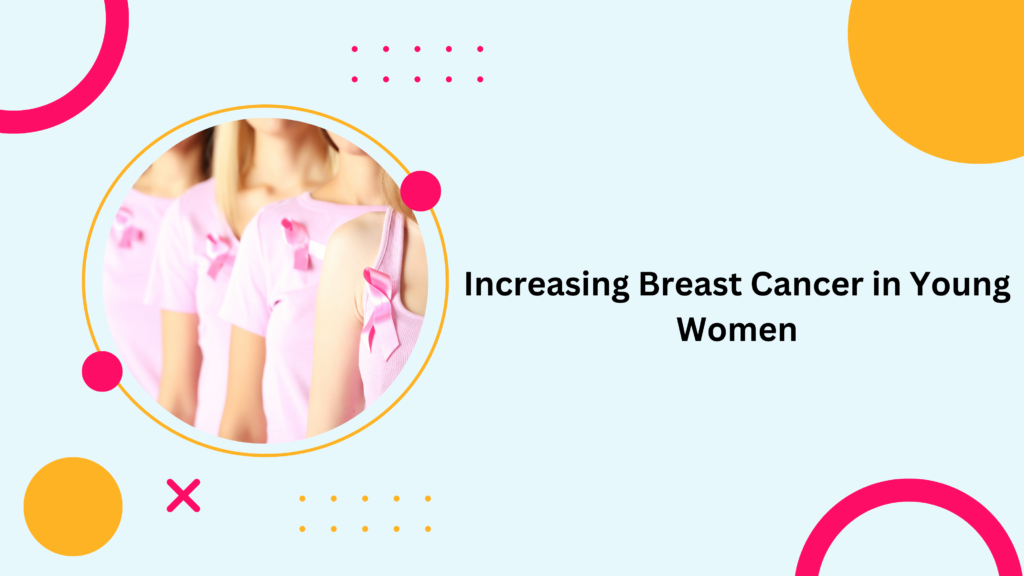
Introduction
Breast cancer has long been associated with older age, but there is a concerning trend emerging – an
increasing incidence of breast cancer in young women. This article delves into the factors
contributing to this trend, the risk factors for young women, the importance of early detection, and
the support available for those facing this diagnosis.
Understanding the Trend
Traditionally, breast cancer has been more common among older women. However, in recent years,
there has been a noticeable increase in breast cancer diagnoses among women in their twenties,
thirties, and forties. This shift in the demographic affected by breast cancer is concerning and
prompts a closer look at potential causes.
Risk Factors for Young Women
Genetic Predisposition
A family history of breast cancer can increase the risk for younger women. Mutations in the BRCA1
and BRCA2 genes can be inherited, significantly raising the likelihood of developing breast cancer.
Genetic counseling and testing are essential for those with a family history.
Lifestyle Choices
Certain lifestyle choices can also impact the risk of breast cancer in young women. Factors such as
obesity, alcohol consumption, smoking, and lack of physical activity may contribute to an increased
risk. Adopting a healthy lifestyle can help mitigate these risks.
The Importance of Early Detection
Early detection remains crucial in the fight against breast cancer. Detecting breast cancer in its early
stages greatly improves the chances of successful treatment and survival. Young women should be
proactive in monitoring their breast health.
Breast Self-Exams
Breast self-exams are a simple yet effective way for young women to monitor their breasts. Regular
self-exams help individuals become familiar with the normal texture and appearance of their breast
tissue, making it easier to detect any changes.
Mammography for Young Women
While mammograms are typically recommended for women over 40, young women with certain risk
factors may benefit from earlier screening. It’s essential to consult with a healthcare provider to
determine the most appropriate screening schedule.
Raising Awareness and Education
Awareness and education are key components of addressing the increasing breast cancer rates in
young women. Educational campaigns, community outreach, and resources that target young
women can help raise awareness about risk factors and the importance of early detection.
Coping with a Diagnosis
A breast cancer diagnosis can be overwhelming at any age. Young women facing this diagnosis may
have unique concerns, including fertility preservation and balancing treatment with family and career
goals. Seeking emotional support and guidance is crucial during this challenging time.
Support and Resources
Numerous support organizations and resources are available to young women diagnosed with breast
cancer. These organizations offer emotional support, financial assistance, and guidance through the
treatment process.
Conclusion
The increasing incidence of breast cancer in young women is a concerning trend that requires
attention and action. Understanding the risk factors, adopting a healthy lifestyle, practicing breast
self-exams, and considering early screening are essential steps young women can take to protect
their breast health. Additionally, raising awareness, seeking support, and staying informed can make
a significant difference in addressing this issue.
FAQs on Increasing Breast Cancer in Young Women
- Why is breast cancer becoming more common in young women?
While the exact reasons are not entirely clear, factors such as genetic predisposition and lifestyle
choices may contribute to the increase in breast cancer among young women. - Should young women with a family history of breast cancer be screened earlier?
Yes, young women with a family history of breast cancer or known genetic mutations should
discuss early screening options with their healthcare provider. - Are there lifestyle changes that can reduce the risk of breast cancer in young women?
Yes, adopting a healthy lifestyle, including regular exercise, a balanced diet, limited alcohol
consumption, and avoiding smoking, can help reduce the risk of breast cancer. - What can young women do to be proactive about their breast health?
Young women can perform regular breast self-exams, stay informed about their family history, and
discuss their risk factors with a healthcare provider. - Where can young women find support if they are diagnosed with breast cancer?
There are numerous support organizations and resources available, including patient advocacy
groups and counseling services, to help young women navigate their breast cancer journey.
In conclusion, the rising incidence of breast cancer among young women is a concerning issue that
calls for increased awareness, proactive health measures, and accessible support. Young women
have the power to take charge of their breast health and make informed decisions that can
potentially save lives.